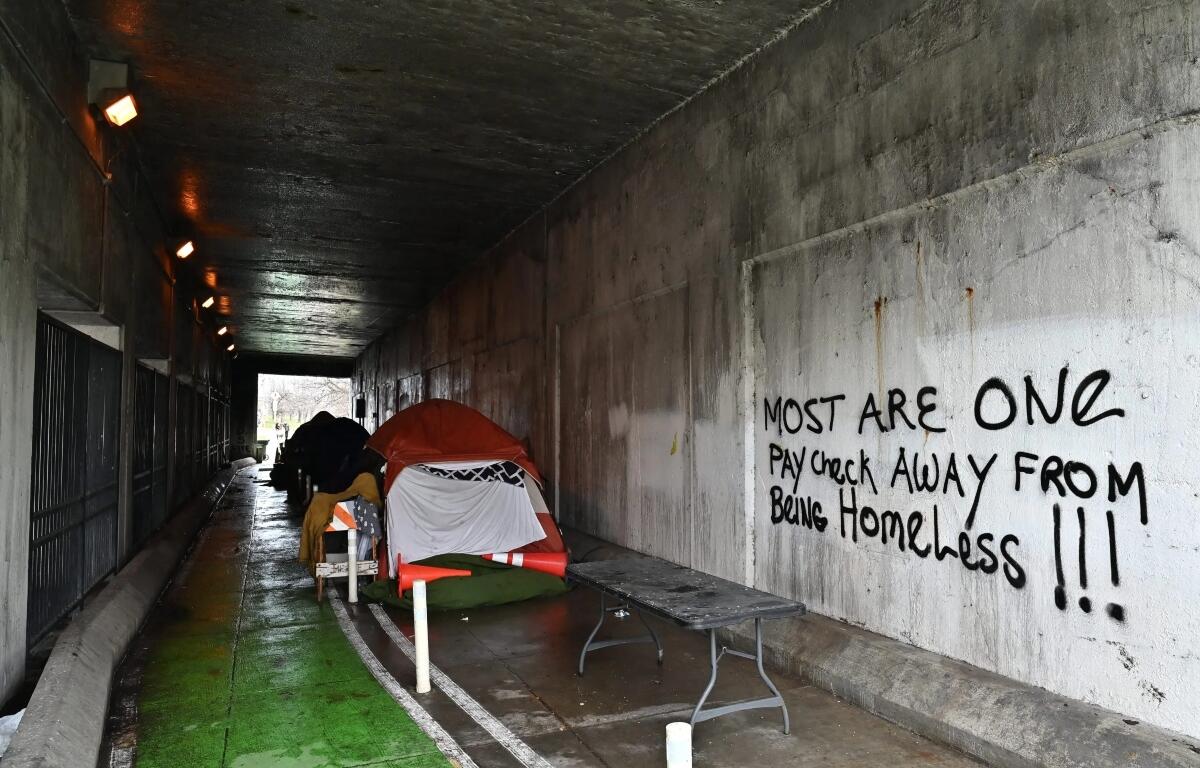(ILLINOIS ANSWERS PROJECT) – Chicago-area housing advocates are bracing for many of the 8,500 formerly unhoused people whose residences are subsidized by the federal government to lose their homes after the Trump administration announced it was drastically changing its funding rules and slashing the money available to subsidize long-term housing solutions.
The Department of Housing and Urban Development late Thursday published new rules which shifts its priorities away from housing-first policies which, advocates say, have been a bipartisan standard for over a decade.
More than 100 groups statewide rely on HUD funding to run affordable apartment buildings or pay rent subsidies to private landlords for people most at-risk of becoming homeless — mainly those who live with long-term disabilities or severe mental illness.
The National Alliance to End Homelessness estimates more than 8,500 permanent-supportive housing beds throughout the state are funded by federal money. Most of those beds are provided by private landlords who could be forced to evict tenants, re-exposing them to homelessness.
The new HUD policy will cap what’s spent of the $182 million funneled to Illinois through what is called its Continuum of Care program. Chicago and Cook County get the bulk of that money — nearly $140 million.
Right now, program administrators estimate they’re spending at least 80% of that money to provide permanent housing for people with disabilities who had been on the streets. By January, HUD will require that percentage drop to no more than a third.
Across the nation, given that nearly 200,000 people would lose their homes under the new rules, “it’s very frightening,” said Fred Spannaus, an independent homelessness consultant who works with Continuum of Care networks downstate.
Under the new rules in January, HUD will require agencies to screen those people looking for housing for immigration status, to agree to comply with a Trump Administration executive order on immigration to deprioritize any programming that emphasizes race or “a definition of sex other than as binary in humans,” and to require work permits.
In a news release, HUD said changes are intended to undermine “failed” housing-first programs, which it stated encourage dependence on government support.
“We are stopping the Biden-era slush fund that fueled the homelessness crisis, shut out faith-based providers simply because of their values and incentivized never-ending government dependency,” HUD Secretary Scott Turner said in the release.
April Redzic, who runs a homelessness prevention program in DuPage County, said she’s concerned that policy changes will reverse progress for hundreds of vulnerable families, including survivors of domestic violence who may begin to feel pressure to return to abusive households.
“I would hate for all of that progress to make families’ lives better to go away,” she said. Redzic noted the second most affected group would be seniors living with disabilities, who are unable to immediately get jobs that would pay for a market-rate apartment.
HUD was already behind in releasing its annual rules, which typically takes housing providers months to complete, but the government shutdown further delayed its issuance.
Jennifer Hill, executive director of the Alliance to End Homelessness in Suburban Cook County, one of 19 continuum of care networks in the state, told Illinois Answers that local service providers are facing an abnormally short timeline to restructure their plans by the Jan. 14 deadline.
The pressure of that timeline is intensified as existing contracts are set to begin to expire as soon as February. If funds dry up or programs don’t match HUD’s requirements, the impact on as many as a thousand suburban households could be immediate, she said.
Hill said landlords who currently receive subsidies “ just don’t know if they’re going to get a contract or if they’re going to get paid.” According to Hill, big changes to funding policy have historically happened over a slow-moving political process but HUD is “skipping all of those steps.”
In a letter to HUD they claim reducing how that money can be spent “would push people back into homelessness and be counterproductive.”
Congress has backed those claims in letters to Turner. House and Senate lawmakers urged the agency to embrace an already approved measure to extend existing contracts without requiring new applications or new rules.
This change is the most recent in a series of Trump administration policies signaling a redirection of federal funds away from the housing-first approach, which focuses on stably housing people before treating other health, economic or social conditions that contribute to homelessness, to treatment-first efforts like involuntary commitments or halfway house programs.
“I think there’s maybe a misconception about people thinking, well, they get housing and then that’s it,” said Iván Arenas, who studies structural drivers of homelessness at UIC’s Institute for Research on Race and Public Policy. Arenas and other researchers have consistently found homelessness programs that couple housing with other services to be highly effective and low-cost.
Despite this, in July, President Donald Trump signed an executive order calling for more aggressive approaches to ending homelessness in the nation.
And in September, HUD released rule changes for a $75 million program that funds affordable housing development with new limits on permanent supportive housing and a preference to programs in states cooperating with federal immigration enforcement. The National Alliance to End Homelessness responded to that announcement by suing HUD in federal court.
Housing experts say they expect the new HUD rules will result in even more lawsuits. They hope either litigation or persistent pressure from Congress will compel HUD to stall the program rollout.
According to Spannaus, if the funding rules do move forward it will do long-term harm to Illinois’ unhoused population.
“It’s going to take a long time to undo the damage that has been done by this administration,” he said.
This article first appeared on Illinois Answers Project and is republished here under a Creative Commons Attribution-NoDerivatives 4.0 International License.



